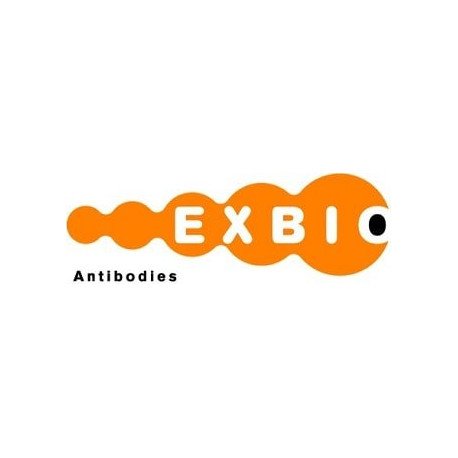Cart 0 Product Products (empty)
No products
To be determined Shipping
0,00 € Total
Prices are tax excluded
Product successfully added to your shopping cart
Quantity
Total
There are 0 items in your cart. There is 1 item in your cart.
Total products (tax excl.)
Total shipping (tax excl.) To be determined
Total (tax excl.)
Data sheet of Mouse Monoclonal to CD59 / Protectin
| Brand | Exbio |
| Product type | Primary antibodies |
| Reactivity | Human |
| Clonality | Monoclonal |
More info about Mouse Monoclonal to CD59 / Protectin
| Brand: | Exbio |
| Product no.: | 11-233-C025 |
| Product type: | Primary antibodies |
| Host species: | Mouse |
| Product name: | Mouse Monoclonal to CD59 / Protectin |
| Antigen: | CD59 |
| Clonality: | Monoclonal |
| Clone: | MEM-43 |
| Isotype: | IgG2a |
| Immunogen: | Thymocytes and T lymphocytes |
| Format: | purified |
| Specificity: | The antibody MEM-43 reacts with well defined epitope (W40, R-53) on CD59 (Protectin), an 18-20 kDa glycosylphosphatidylinositol (GPI)-anchored glycoprotein expressed on all hematopoietic cells; it is widely present on cells in all tissues. This antibody does not compete with MEM-43/5. _x000D_ HLDA IV; WS Code NL 705 _x000D_ HLDA V; WS Code AS S013 _x000D_ HLDA V; WS Code BP BP345 _x000D_ HLDA V; WS Code T T-103_x000D_ |
| Categories: | CD and Related Antigens (Human) |
| Concentration: | 1 mg/ml |
| Storage buffer: | Phosphate buffered saline (PBS) with 15 mM sodium azide, approx. pH 7.4 |
| Storage / stability: | Store at 2-8°C. Do not freeze. Do not use after expiration date stamped on vial label. |
| Background: | CD59 (Protectin) is a small (18-20 kDa) GPI-anchored ubiquitously expressed inhibitor of the membrane attack complex (MAC). It is thus the key regulator that preserves the autologous cells from terminal effector mechanism of the complement cascade. CD59 associates with C5b-8 complex and thereby counteracts appropriate formation of cytolytic pore within the plasma membrane. CD59 is also an low-affinity ligand of human CD2 and causes T cell costimulation. |
| Purity: | > 95% (by SDS-PAGE) |
| Purification: | Purified by protein-A affinity chromatography |
| Product specific references: | *IMPORTANT ARTICLE: Robert Sutherland D, Keeney M, Illingworth A: Practical guidelines for the high-sensitivity detection and monitoring of paroxysmal nocturnal hemoglobinuria (PNH) clones by flow cytometry. Cytometry B Clin Cytom. 2012 Apr 12. doi: 10.1002/cyto.b.21023. [Epub ahead of print]_x000D_ Note: This article recommends PE-conjugated MEM-43 as a good reagent for red blood cell analysis of PNH (Paroxysmal Nocturnal Hemoglobinuria) by flow cytometry., *Stefanova I, Hilgert I, Kristofova H, Brown R, Low MG, Horejsi V: Characterization of a broadly expressed human leucocyte surface antigen MEM-43 anchored in membrane through phosphatidylinositol. Mol Immunol. 1989 Feb;26(2):153-61. _x000D_ , *Stefanova I, Horejsi V, Ansotegui IJ, Knapp W, Stockinger H: GPI-anchored cell-surface molecules complexed to protein tyrosine kinases. Science. 1991 Nov 15;254(5034):1016-9. _x000D_ , *Cinek T, Horejsi V: The nature of large noncovalent complexes containing glycosyl-phosphatidylinositol-anchored membrane glycoproteins and protein tyrosine kinases._x000D_ J Immunol. 1992 Oct 1;149(7):2262-70. _x000D_ , *Bodian DL, Davis SJ, Morgan BP, Rushmere NK: Mutational analysis of the active site and antibody epitopes of the complement-inhibitory glycoprotein, CD59. J Exp Med. 1997 Feb 3;185(3):507-16., Cebecauer M, Cerny J, Horejsi V: Incorporation of leucocyte GPI-anchored proteins and protein tyrosine kinases into lipid-rich membrane domains of COS-7 cells. Biochem Biophys Res Commun. 1998 Feb 24;243(3):706-10. _x000D_ , *Forsberg UH, Bazil V, Stefanova I, Schroder J: Gene for human CD59 (likely Ly-6 homologue) is located on the short arm of chromosome 11. Immunogenetics. 1989;30(3):188-93. _x000D_ , *Horejsi V, Hilgert I, Kristofova H, Bazil V, Bukovsky A, Kulhankova J: Monoclonal antibodies against human leucocyte antigens. I. Antibodies against beta-2-microglobulin, immunoglobulin kappa light chains, HLA-DR-like antigens, T8 antigen, T1 antigen, a monocyte antigen, and a pan-leucocyte antigen. Folia Biol (Praha). 1986;32(1):12-25. (original description of MEM-43 antigen), *Ilangumaran S, Briol A, Hoessli DC: CD44 selectively associates with active Src family protein tyrosine kinases Lck_x000D_ and Fyn in glycosphingolipid-rich plasma membrane domains of human peripheral blood lymphocytes. Blood. 1998 May 15;91(10):3901-8., *Omidvar N, Wang EC, Brennan P, Longhi MP, Smith RA, Morgan BP: Expression of glycosylphosphatidylinositol-anchored CD59 on target cells enhances_x000D_ human NK cell-mediated cytotoxicity. J Immunol. 2006 Mar 1;176(5):2915-23._x000D_ _x000D_ _x000D_ , *And many other., *Leukocyte Typing V., Schlossman S. et al. (Eds.), Oxford University Press (1995)._x000D_ , *Leukocyte Typing IV., Knapp W. et al. (Eds.), Oxford University Press (1989). |
| General references: | *Baalasubramanian S, Harris CL, Donev RM, Mizuno M, Omidvar N, Song WC, Morgan BP: CD59a is the primary regulator of membrane attack complex assembly in the mouse. J Immunol. 2004 Sep 15;173(6):3684-92._x000D_ , *Menu E, Tsai BC, Bothwell AL, Sims PJ, Bierer BE: CD59 costimulation of T cell activation. CD58 dependence and requirement for glycosylation. J Immunol. 1994 Sep 15;153(6):2444-56._x000D_ , *Rooney IA, Davies A, Griffiths D, Williams JD, Davies M, Meri S, Lachmann PJ, Morgan BP: The complement-inhibiting protein, protectin (CD59 antigen), is present and functionally active on glomerular epithelial cells. Clin Exp Immunol. 1991 Feb;83(2):251-6._x000D_ _x000D_ _x000D_ , *Meri S, Morgan BP, Davies A, Daniels RH, Olavesen MG, Waldmann H, Lachmann PJ: Human protectin (CD59), an 18,000-20,000 MW complement lysis restricting factor, _x000D_ inhibits C5b-8 catalysed insertion of C9 into lipid bilayers. Immunology. 1990 Sep;71(1):1-9._x000D_ _x000D_ _x000D_ |
| Related products: | - Mouse Monoclonal to CD62L (bovine) - Mouse Monoclonal to CD6 - Mouse Monoclonal to CD61 |
| Shipping condition: | Room temperature |


